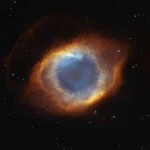Dear Sir: You are reported to have said that there is no order or disorder in the universe apart from what man himself puts there — this in spite of your well-known preoccupation with a fluid and congruent universe. Can you tell us how you reconcile this, with regard in particular to your views on God?
Sincerely,
Sarah H
Dear Sarah H: I don’t recall my exact wording of that statement, but I’m certain it’s not as you recapitulate. Presumably you’re referring to my conviction that order and disorder are epistemological words, not metaphysical. By which I mean, they are products of the human brain, and nothing in nature is “disorderly”; it simply is. To speak of order or disorder apart from the human mind is like speaking of color to a person born blind.
Using a slightly less elaborate metaphor, I might, however, concede that nature is “congruent” in the sense that each thing in the universe, however small or large, has a specific nature and must act in accord with that nature.
In this way — and this is also known as the law of essence or identity — the universe is indeed congruent and elegant.
Matter acts and reacts as it must. Matter does not possess will. That is why there’s really no such thing as chance.
It is in this sense that the Nobel Prize winning doctor Christian de Duve, in his fine book Vital Dust, speaks of the universe as a “cosmic imperative.” By that he means nature does not possess volition – or, if you prefer, nature does not possess choice, as humans do.
Nature must act as it does because the identity of each thing determines how it must act. This applies as much to a bursting star as it does to a microscopic particle.
As for God, I can only explain Her popularity by an atheist’s nighttime sweats.


“As for God, I can only explain Her popularity by an atheist’s nighttime sweats.”
Huh? How’s that?
“Nature must act as it does because the identity of each thing determines how it must act.”
The law of identity presupposes that this ‘identity’ is the cause of motion in matter. In order for that to be true, ‘identities’ must be causally independent of the universe, and thus reality. Otherwise, if reality produced its own ‘identities,’ it would a grave contradiction. And we have now arrived at square-one of Western philosophy’s false paradigm which has been nothing more than an unnecessary crutch to mankind; dualism, essentialism, and hence, modernity.
Just as you say “order” and “disorder” are human constructs that are externally portrayed upon reality, these ‘identities’ are another version of man’s attempt to anthropocentrize the universe, in order to understand the universe. But who made the form of ‘man’ the pinnacle and apotheosis of all being in the universe, other than man himself?
“Man is the measure of all things,” said Protagoras.
The universe “simply is,” and the universe being something are two very contradictory notions my friend. One is a state of being, and another is an idealist attempt at objectifying the universe’s beingness.
– Roquentin
You’re incorrect: to be is to be something.
The rest is an elaboration on that.